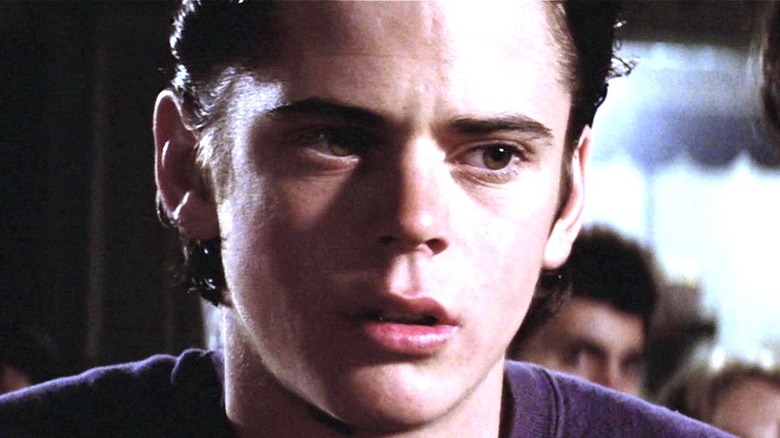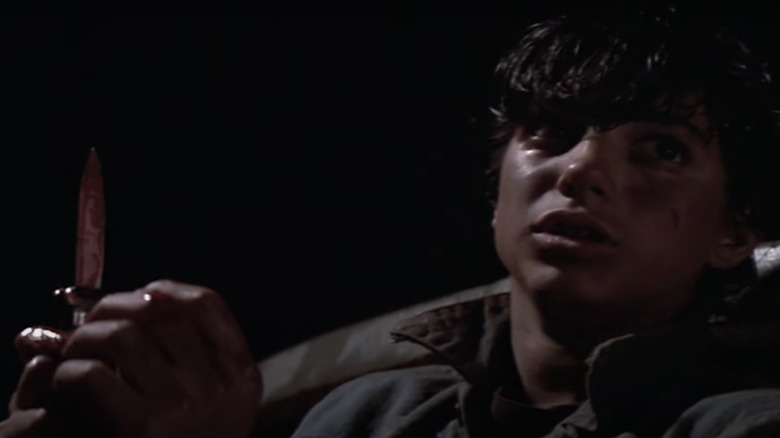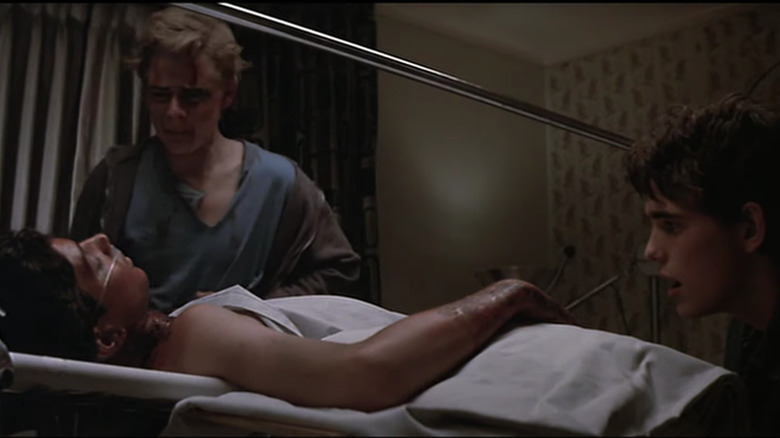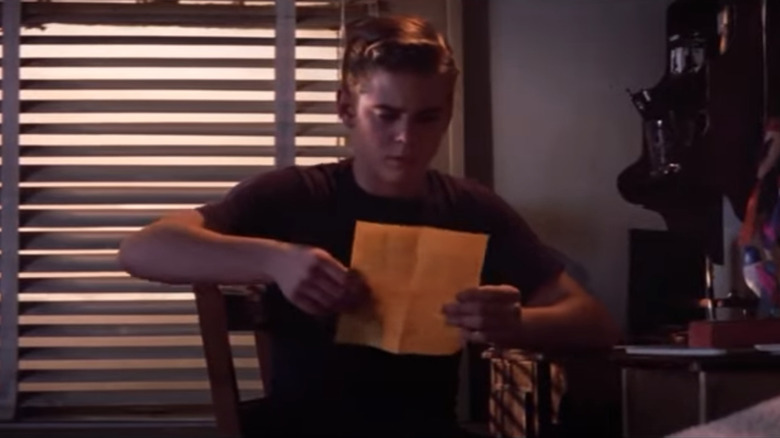The Ending Of The Outsiders Explained
Francis Ford Coppola's 1983 adaptation of S.E. Hinton's "The Outsiders" remains a beloved coming-of-age film today for good reason. Based on the classic young adult novel of the same name, "The Outsiders" features a killer ensemble cast, which includes Rob Lowe, Tom Cruise, and Emilio Estevez of the illustrious Hollywood Brat Pack of the '80s. Additionally, its heartbreaking story still resonates with young audiences today.
Set in 1960s Oklahoma, "The Outsiders" follows an age-old tale of two rival gangs on either side of the tracks. You got the "Socs" (short for "socials"), who are the rich kids with fancy cars and letterman jackets. Then there's the "Greasers," the poor kids with slicked-back hair who live on the wrong side of town. The film follows the point of view of Ponyboy Curtis (C. Thomas Howell), a Greaser and the youngest of three orphaned brothers. Ponyboy has a strained relationship with his oldest brother Darrel (Patrick Swayze) who took on the role of caregiver after their parents died, and poor Sodapop (Rob Lowe) is stuck in the middle. After one fateful night, Ponyboy is forced to go on the run, eventually leading to some devastating consequences. Here's how the ending of "The Outsiders" plays out.
Things heat up when Johnny kills a Soc
Things start rolling in the film when Ponyboy, Johnny Cade (Ralph Macchio), and Dallas "Dally" Winston (Matt Dillon) get a bit too friendly with a couple of Soc girls at the drive-in theater. Of course, their Soc boyfriends Bob (Leif Garrett) and Randy (Darren Dalton) can't have Greasers talking to their girlfriends, so the two quickly become furious. Later on, when Ponyboy runs off to the park with Johnny, the two are right in the line of fire of Bob and Randy's alcohol-infused rage. A fight ensues, and after almost being drowned in a park fountain, Ponyboy regains consciousness to find a blubbering Johnny admitting he had killed Bob in self-defense. Now on the run, the Greasers turn to certified bad boy Dally, who helps them go into hiding at an abandoned church.
Although these events happen towards the beginning of the film, they essentially serve as the catalyst to the film's final act. Johnny killing the Soc in self-defense is what causes the two boys to go on the run and leads them to the abandoned church, which is significant later on. It also causes an immense amount of legal trouble for the two, leading Ponyboy to worry about whether or he will be sent to a boy's home for the remainder of the film.
Johnny's death leads Dally off the deep end
While still in hiding, Ponyboy and Johnny catch up with Dally for lunch, but when they return to their safe house, they find it in flames with children trapped inside. Johnny comes to the rescue and saves the children, but suffers severe burns and a broken back. With Johnny recovering in the hospital, Ponyboy and Dally return home to find that their fellow Greasers and the Socs are gearing up for a rumble, with the latter seeking vengeance for Bob's murder. The two gangs square up in the park, then punches start flying until eventually, the Socs are chased away and the Greasers are left to celebrate. Dally and Ponyboy then head off to see Johnny in the hospital. Johnny sadly passes away — but not before telling Ponyboy to "stay gold." This leads Dally to go off on a grief-fueled rampage, and he ultimately gets killed in a stand-off with police.
The rumble in the film's final act serves as the tipping point of the rivalry between the two gangs. The two groups have been clashing throughout the whole film until finally, the Greasers get the upper hand when they win the brawl. Additionally, Johnny's death serves as a turning point for a couple of reasons. Firstly, it affects Dally so much that he loses all control of his dangerous impulses. Secondly, it reveals the contrast between Johnny, Ponyboy, and the rest of the Greasers — but more on that later.
Johnny's letter reveals Ponyboy's true self
In the final scenes of "The Outsiders," at least in "The Complete Novel" version, Ponyboy is cleared of any wrongdoing in court for Bob's murder. We also see Ponyboy and his two brothers, Sodapop and Darrel, make up for good when Darrel promises to stop laying into Ponyboy so hard. Finally, the film sees Ponyboy sitting down to write his school essay, only to find a letter from Johnny. In it, Johnny tells Ponyboy his interpretation of the Robert Frost poem "Nothing Gold Can Stay" and writes, "He meant you're gold when you're a kid, like green. When you're a kid everything's new, dawn. Like the way you dig sunsets, Pony, that's gold. Keep it that way, it's a good way to be."
Because of this ending, Ponyboy no longer has to worry about being separated from his brothers. Plus, his relationship with his older brothers seems to have vastly improved. Johnny's letter reveals just how different Ponyboy is from his other gangmates. He's thoughtful, caring, more reserved, and he "digs sunsets." Johnny even tells Ponyboy to ask Dally to look at a sunset since he doesn't think he's ever seen one, further revealing how different Ponyboy and Dally were. Johnny is also telling Ponyboy to hold on to his innocence and to remain good and "gold." Additionally, the letter states how Johnny doesn't regret saving those children, showing his true selflessness despite his bad-boy exterior.
Finally, "The Outsiders" comes full circle when Ponyboy repeat's the iconic line from the beginning, "As I stepped out into the bright sunlight..." This further represents a new beginning for Ponyboy following all the challenges he and his friends and brothers dealt with earlier in the film.



